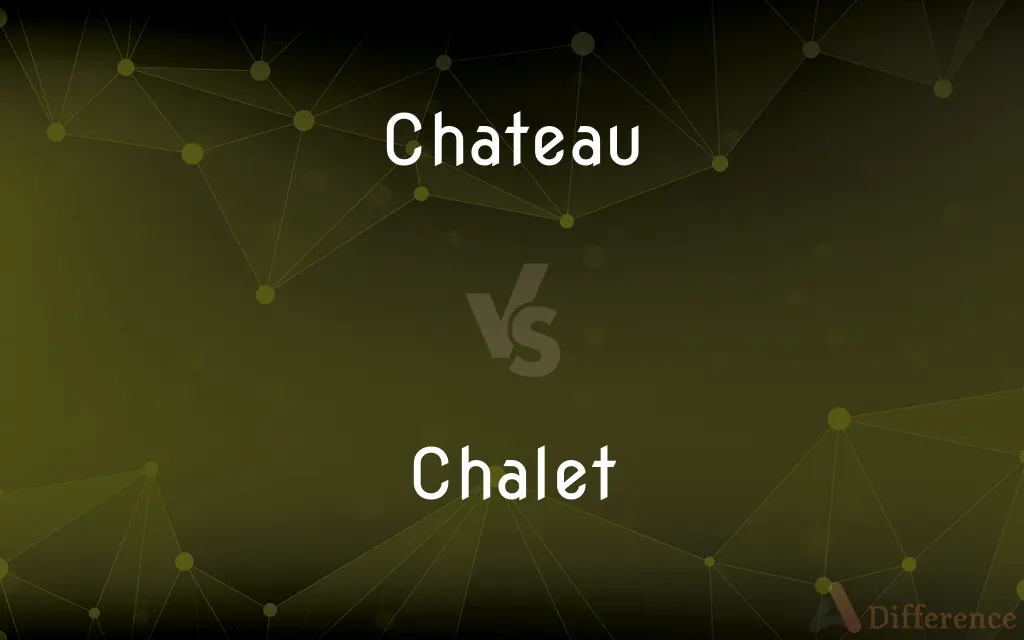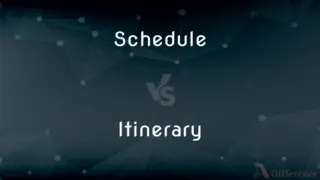Chateau vs. Chalet — What's the Difference?
By Urooj Arif & Fiza Rafique — Updated on March 7, 2024
A chateau is a large French country house or castle, often associated with luxury and historical significance, whereas a chalet is a wooden dwelling with a sloping roof, typical in Alpine regions, known for its cozy, rustic charm.

Difference Between Chateau and Chalet
Table of Contents
ADVERTISEMENT
Key Differences
A chateau, originating in France, refers to a grand residence or castle, frequently surrounded by vast lands and vineyards, symbolizing wealth and nobility. In contrast, a chalet is a type of mountain lodge found primarily in the Swiss Alps, designed with steep roofs to prevent snow accumulation and often made of wood for a warm, inviting atmosphere.
Chateaus are historically significant, showcasing architectural advancements and the cultural heritage of the French nobility. They are characterized by their luxurious design elements, including intricate facades and expansive gardens. On the other hand, chalets are known for their practical design, tailored to the harsh mountainous environment, prioritizing warmth and comfort over grandeur.
The term "chateau" can encompass a range of structures from medieval fortresses to Renaissance palaces, reflecting the social and political stature of their owners. Conversely, chalets are primarily residential or vacation homes, reflecting a connection with nature and a preference for simplicity and functionality.
Ownership of a chateau often implies a connection to history and a commitment to preserving architectural heritage. In contrast, owning a chalet suggests a love for the outdoors and a desire for a tranquil retreat away from the hustle and bustle of city life.
While both chateaus and chalets serve as residences, their differences lie in their architectural styles, historical contexts, and cultural significances, with chateaus embodying French elegance and historical depth, whereas chalets offer a cozy sanctuary in harmony with nature.
ADVERTISEMENT
Comparison Chart
Origin
France
Swiss Alps
Material
Stone, bricks
Wood
Design
Luxurious, historical
Rustic, cozy
Purpose
Residence, historical site
Mountain lodge, vacation home
Roof
Varied, often flat or with gentle slopes
Steeply sloped
Setting
Country estates, vineyards
Mountainous regions
Cultural Significance
Symbol of nobility and luxury
Connection with nature, simplicity
Compare with Definitions
Chateau
Often associated with nobility and historical events.
Chateau de Chambord is renowned for its Renaissance architecture.
Chalet
Designed to withstand harsh winter conditions.
Its steep roof prevented snow from accumulating during the heavy snowfall.
Chateau
A large French country house or castle.
The chateau stood majestically on the vineyard, a testament to historical luxury.
Chalet
A wooden house with a sloping roof, typical in Alpine regions.
The cozy chalet offered a warm refuge after a day of skiing.
Chateau
Symbolizes wealth and architectural heritage.
The chateau’s restoration has preserved its centuries-old elegance.
Chalet
Known for its rustic charm and simplicity.
The chalet’s wooden interiors exuded a warm, welcoming atmosphere.
Chateau
Features luxurious design and expansive grounds.
Its gardens and ornate rooms make the chateau a popular tourist attraction.
Chalet
Often used as vacation homes or lodges.
Many chalets are available for rent to tourists seeking a mountain getaway.
Chateau
Can be used for various purposes, including museums.
Some chateaus have been converted into museums, showcasing art and history.
Chalet
Reflects a close relationship with the natural environment.
The chalet’s design emphasizes harmony with the surrounding Alpine landscape.
Chateau
A large French country house or castle, often giving its name to wine made in its neighbourhood
Château Margaux
Chalet
A chalet (pronounced in British English; in American English usually ), also called Swiss chalet, is a type of building or house, typical of the Alpine region in Europe. It is made of wood, with a heavy, gently sloping roof and wide, well-supported eaves set at right angles to the front of the house.
Chateau
A castle or manor house in a French-speaking region.
Chalet
A wooden dwelling with a low-pitched roof and wide eaves, common in Alpine regions.
Chateau
An estate where wine is produced and often bottled, especially in the Bordeaux region of France.
Chalet
A cottage or lodge built in this style.
Chateau
A large country house.
Chalet
The hut of a herder in the Swiss Alps.
Chateau
Alternative spelling of château
Chalet
An alpine style of wooden building with a sloping roof and overhanging eaves.
Chateau
A castle or a fortress in France.
Chalet
A herdsman's hut in the mountains of Switzerland.
Chalets are summer huts for the Swiss herdsmen.
Chateau
A manor house or residence of the lord of the manor; a gentleman's country seat; also, particularly, a royal residence; as, the chateau of the Louvre; the chateau of the Luxembourg.
Chalet
A summer cottage or country house in the Swiss mountains; any country house built in the style of the Swiss cottages.
Chateau
An impressive country house (or castle) in France
Chalet
A Swiss house with a sloping roof and wide eaves or a house built in this style
Common Curiosities
What is the main difference between a chateau and a chalet?
The main difference lies in their origins, purposes, and architectural styles: chateaus are grand, historical French residences, while chalets are cozy, wooden mountain lodges.
Can a chalet be considered luxurious?
Yes, while chalets are known for their rustic charm, many are designed with luxury in mind, offering high-end amenities and finishes.
What makes a chateau historically significant?
Many chateaus are significant due to their architecture, their role in historical events, or their association with notable figures from history.
Is it more expensive to maintain a chateau or a chalet?
Generally, maintaining a chateau is more expensive due to its larger size, historical value, and the complexity of its architectural details compared to the more straightforward, rustic design of a chalet.
Are chalets only used in winter?
While chalets are popular in winter for skiing holidays, they are also enjoyed in summer for hiking and enjoying the natural beauty of the mountains.
Do all chateaus have vineyards?
Not all, but many chateaus, especially in regions like Bordeaux and Loire Valley, are situated on vineyards as viticulture is a traditional activity associated with them.
How has the concept of a chateau evolved over time?
While chateaus were originally built as fortresses and symbols of power, many have evolved into cultural landmarks or luxury accommodations, reflecting changes in their use and societal values.
Can chateaus be found outside of France?
Yes, while chateaus are characteristic of France, similar structures can be found in other countries, often influenced by French architectural styles.
Are chalets exclusive to the Swiss Alps?
While chalets are typical of the Swiss Alps, the chalet-style has been adopted in other mountainous regions worldwide due to its practicality and aesthetic appeal.
What is the cultural significance of a chalet?
Chalets symbolize a lifestyle that values simplicity, nature, and a retreat from modern life’s complexities.
Share Your Discovery

Previous Comparison
Schedule vs. Itinerary
Next Comparison
Shark vs. BirdAuthor Spotlight
Written by
Urooj ArifUrooj is a skilled content writer at Ask Difference, known for her exceptional ability to simplify complex topics into engaging and informative content. With a passion for research and a flair for clear, concise writing, she consistently delivers articles that resonate with our diverse audience.
Co-written by
Fiza RafiqueFiza Rafique is a skilled content writer at AskDifference.com, where she meticulously refines and enhances written pieces. Drawing from her vast editorial expertise, Fiza ensures clarity, accuracy, and precision in every article. Passionate about language, she continually seeks to elevate the quality of content for readers worldwide.














































